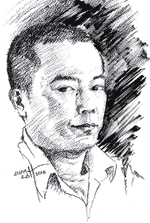
| By YENI | Wednesday, August 18, 2010 |
Burmese junta chief Snr-Gen Than Shwe has finally chosen a date for his election—November 7. It seems as if the Burmese dictator is almost ready to drive through his plan to produce a contrived outcome. The operation, however, could not be completed without a tradition he usually relies on— astrologers’ advice.
 |
| Yeni is news editor of the Irrawaddy magazine. He can be reached at [email protected]. |
In Burma's modern history, all rulers have also sought advice from soothsayers to determine auspicious dates, times, names and even units of currency.
The formal declaration of Burma's independence from Britain—4:20 am on January 4, 1948—was exactly timed with the help of astrologers. In 1987, the late dictator Gen Ne Win introduced 45 kyat and 90 kyat currency notes, as the face values added up to nine, the most powerful number according to numerological calculation.
Like his predecessors, Than Shwe has utilized the astrologers’ advice to confirm and approve of his deeds. The relocation of the country's administrative capital from Rangoon to Naypyidaw (the “Seat of Kings”) in 2005 was worked out with the counsel of his astrologers.
Than Shwe’s latest favorite number is eleven. Astrologers have reportedly advised him to prevent his regime suffering the “eleven fires”—greed, hatred, delusion, birth, aging, death, grief, lamentation, pain, sorrow and despair, which, in a spiritual context, are fueled by sentient attachment.
It is believed that the prison sentences of 65 years handed out to prominent pro-democracy activists in 2008 were calculated to reflect the number 11—six plus five.
November—when the election will be held—is the eleventh month of the year.
It is easy, therefore, to understand why Than Shwe rejected the date of October 10, 2010 (10-10-10), which had been predicted by US Senator Jim Webb and the Japanese newspaper Asahi Shimbun.
Than Shwe’s decision seems to be based on merging his own lucky number 11 with another auspicious digit, 7. Seven is the number of days in a week, on one of which Than Shwe and the generals will have been born.
By defeating the “11 fires,” Than Shwe and his generals can achieve the number 9 by combining 11 and 7, which add up to 18, and then dividing 18 into 1 plus 8. Hey presto, the result is 9!
Exiled Burmese activists are interpreting the numbers in their own satirical way by comparing them to the digits of the 7-Eleven 24-hour convenience stores.
One political joke says Burmese voters are being forced to buy Naypyidaw's own products on November 7—the candidates of the government-backed Union Solidarity and Development Party (USDP). “That's a 24 hours oppression service,” said one activist. “You will be very inconvenienced.”
Than Shwe doesn't need his astrologers to predict the result of the November election, however. He's hoping that ballot box tricks, manipulation and the dominance of the USDP will guarantee him a 99 percent victory—just as he concocted in the 2008 constitutional referendum.